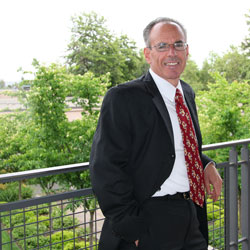
Gary Pieroni
Gary Pieroni, MBA, a professor of accounting in the business department at Diablo Valley College, has been named to the new Accounting Education Committee (AEC) of the California Board of Accountancy.
The newly-established committee held its inaugural public meeting in April in Sacramento. The AEC is tasked with addressing some of the most significant changes in a decade in the accounting education requirements for licensure as a California Certified Public Accountant (CPA).
Pieroni earned his B.A. from California State University, Hayward, and his M.B.A. from John F. Kennedy University. In addition to his tenured position at DVC, Pieroni is a visiting professor of accounting at UC Berkeley. He has worked in the public, private and educational sectors, with 20 years teaching experience and 13 years business experience with a Fortune 500 company.
Pieroni said, “I was deeply honored that the CBA appointed me to the AEC, especially since the president of the Board later indicated they had 10 times the applicants they had expected. I will be one of nine members tasked with assisting the California Board of Accountancy in implementing the new education requirements for current and future accounting professionals seeking California licensure for certified public accounting as a result of California Senate Bill 819.”
The committee is the result of legislation that took effect January 1, and will impact all individuals who apply for a CPA license after January 1, 2014.
“Presently,” Pieroni explained, “the CBA maintains two pathways to licensure. SB 819 establishes a sunset date of January 1, 2014, for Pathway 1, while at the same time requiring refinement of the requirements for Pathway 2.” Specifically, he said, of the 150 units required for licensure under Pathway 2, SB 819 now requires that an additional 30 of those units be defined.
“My role, as a member of the AEC,” Pieroni said, “is to define 20 of those additional 30 accounting-related units. Another 10 units of ethics education make up the remaining units.” The purpose of the new educational requirements is to offset the loss of Pathway 1 and its requirement for two years of experience.
“The Legislature established a separate Advisory Committee on Accounting Ethics Curriculum to define the ethics-related course units,” Pieroni explained, “but both groups will need to articulate, since the law disallows an ethics course to double-count in fulfillment of both the ethics requirement and the accounting study requirement.
“My goal is to help draft proposed regulations to define the new 20 units of accounting study for CBA review and adoption,” Pieroni continued. “In doing this, the AEC will need to determine an appropriate breakdown of the 20 units of accounting study between accounting and business-related subjects. Additionally, we will need to deliberate on whether to define ‘independent study.’ Presently the CBA does not have a definition of what constitutes independent study, and a definition may be necessary to provide clarity to colleges and universities, to students around the world seeking California licensure, and to CBA staff. Further, the AEC will need to deliberate on whether to define ‘other academic work,’ among other things.”
In selecting the AEC members, the Board of Accountancy paid close attention to choosing a diverse group of educators who would bring a range of viewpoints and experience to the committee.
In addition to Pieroni, members of the committee include chairman Ruben A. Davila, Esq., clinical professor of accounting at the USC Leventhal School of Accounting; Sherri Anderson, CPA (inactive), MBA, professor of accounting at Sonoma State University; Betty Chavis, Ph.D., CPA, chair and professor of accounting, CSU Fullerton School of Business Administration and Economics; Thomas M. Dalton, Ph.D., CPA, professor of accounting and Director of Undergraduate Programs, University of San Diego School of Business Administration; Donald A. Driftmier, CPA, and CBA member since 2004; Michael L. Moore, Ph.D., CPA, chair and professor, UC Riverside Anderson Graduate School of Management, Department of Accounting and Information Systems; Sara Seyedin, Ph.D., chair and professor of accounting, Foothill College; and Xiaoli “Charlie” Yuan, Ph.D., assistant professor, CSU-East Bay.
Created by statute in 1901, the CBA mandate ensures that protection of the public shall be the highest priority for the California Board of Accountancy in exercising its licensing, regulatory, and disciplinary functions. The CBA currently regulates more than 81,000 licensees, including individuals, partnerships, and corporations, the largest group of licensed accounting professionals in the nation.

